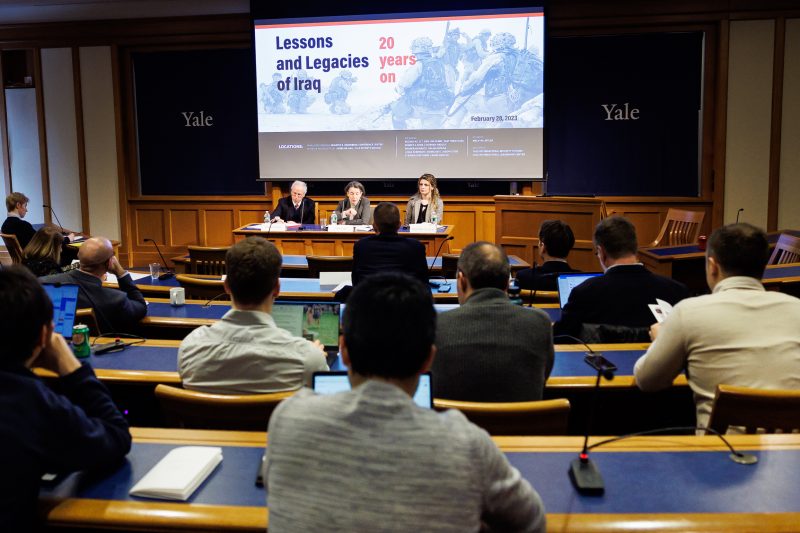On March 20, 2003, US-led forces launched an attack against Iraq and, soon after, invaded the country as part of President George W. Bush’s Global War on Terror. The reasoning — since disproven — was based on claims that Iraqi President Saddam Hussein was stockpiling weapons of mass destruction and aiding terrorist groups in the Middle East including al-Qaeda, which was responsible for the September 11th terrorist attacks. The lengthy conflict has since ended, but the impacts of the war endure to this day — particularly across Iraq and the Middle East.
On February 28, the International Leadership Center and International Security Studies—both part of the Jackson School of Global Affairs—held a day-long symposium, “Lessons and Legacies of Iraq 20 Years On,” which convened experts from the government, military, media, and academia to reflect on the war and its impacts on current-day foreign policy and national security.
The event began with a conversation with Stephen Hadley, U.S. National Security Advisor from 2005 to 2009, moderated by Arne Westad, Elihu Professor of History and Global Affairs and director of International Security Studies at the Jackson School. Hadley explained that the events of September 11th quickly changed the Bush Administration’s agenda from one based on domestic policy reform — namely, education and immigration — to a focus on national security to prevent further, more sinister attacks.
In retrospect, Hadley explained, the administration’s military strategy in Iraq was backwards. Rather than “taking on the enemy” first and then establishing a democratic government once that was achieved, he believes the administration’s final objective should have been prioritized — creating “less of a military undertaking and more of a civilian undertaking.”
“You need to find where you want to end up and make sure the things you do along the way actually lead you in that direction. At the time, I don’t think it occurred to any of us to do our planning in that way — but I think one of the lessons from Iraq is to plan for that kind of action in the future,” said Hadley.
Another panel discussion, “The Middle East in the Wake of Operation Iraqi Freedom,” focused on the civilian costs of the war. Beyond the dangers of living in a warzone during the conflict, the Iraqi people now live in a very fragmented country, the panelists explained, with certain regions needing access to necessary resources, devoid of proper representation in government, and suffering from a lack of social identity.
“One thing the US hasn’t done enough is prioritize human rights of the Iraqi people,” said panelist and New York Times journalist Rozina Ali. “Too much effort was spent propping up a democratic government and now, that government is not working for its people.”
Salma Mousa, an assistant professor of political science at Yale, explained that the rise of the Islamic State in Iraq has not only caused geographic fragmentation, but a lack of “social cohesion.” Christians living in Iraq have been displaced and cling tightly to their own religious communities for their personal safety, said Mousa — and some feel it won’t be long before Christians are eradicated from the country.
“There are stronger bonds to religious groups than to the country,” she said during the panel. “There need to be better policy tools, more autonomy, and more political representation to create more social cohesion.”
Panelists also discussed the threat of Iran, which has meddled in Iraqi politics since the overthrow of Hussein and has been the target of protests by Iraqi citizens in recent years. Matthew Duss, a visiting scholar at the Carnegie Endowment for International Peace, explained that the US “handed a gift” to their long-time adversary Iran by creating instability in Iraq.
“Their greatest enemy stepped in and did the hard work for them,” Duss said of Iran. “[Americans] need to practice accountability for what we’ve done and, if stability is shattered again, I hope and pray we don’t respond the way we did 20 years ago.”
Following the panel discussions, the symposium closed with a keynote address by Melvyn P. Leffler, professor of history at the University of Virginia.
